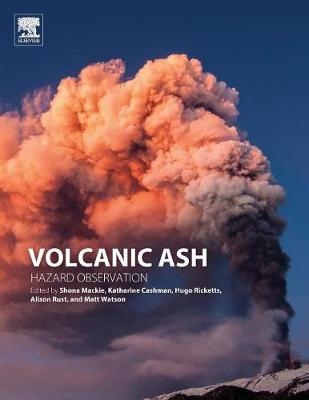
Volcanic Ash
Elsevier / The Lancet (Verlag)
978-0-08-100405-0 (ISBN)
The book begins with an examination of the methods to characterize ash deposits on the ground, as ash deposits on the ground have generally experienced some atmospheric transport. This section will also cover basic information on ash morphology, density, and refractive index, all parameters required to understand and analyze assumptions made for both in situ measurements and remote sensing ash inversion techniques. Sections two, three, and four focus on methods for observing volcanic ash in the atmosphere using ground-based, airborne, and spaceborne instruments respectively.
Throughout the book, the editors showcase not only the interdisciplinary nature of the volcanic ash problem, but also the challenges and rewards of interdisciplinary endeavors. Additionally, by bringing together a broad perspective on volcanic ash studies, the book not only ties together ground-, air-, academic, and applied approaches to the volcanic ash problem, but also engages with other scientific communities interested in particulate transport.
Shona Mackie has a PhD from the University of Edinburgh, where she worked on a project developing a new method for interpreting cloud data from satellite imagery for assimilation into weather forecast models. After a period working on operational wind energy forecasting, she returned to academic research to work on the challenges of detecting volcanic ash in satellite data, and to look at methods for forecasting its evolution and transport. Shona has presented her work at international conferences and published in it in peer-reviewed journals and is an associate fellow of the Royal Meteorological Society and a former fellow of the American Meteorological Society. She convened a successful session at EGU 2014 focused on volcanic ash and is an editor of the special issue of the Annals of Geophysics that followed from that session. Kathy Cashman studied for a BA degree in Geology and Biology at Middlebury College, Vermont, USA (1976), for an MSci (1st class Hons) at Victoria University, Wellington (New Zealand) and for a PhD in Earth Sciences at Johns Hopkins University, Maryland, USA (1986). Her PhD project concerned applying theories of crystal size distributions to volcanic systems, and was supervised by Professor Bruce Marsh. She was an Assistant Professor at Princeton University, New Jersey, USA (1986-1991), and then an Associate (1991-1997) and Full (1997-present) at the University of Oregon. Kathy came to Bristol in 2011 on a three year Research Professorship funded by the AXA insurance company. In December 2013 she was offered an AXA Endowed Chair at Bristol. Kathy was Head of the Department of Geological Sciences, University of Oregon (2007-10) and President of the Volcanology, Geochemistry and Petrology (VGP) section of the American Geophysical Union (AGU; 2002-2004). In 2003 she was made a Distinguished Professor of the College of Arts and Sciences (Oregon), and in 2007 Kathy was made a Philip H. Knight Distinguished Professor of Natural Science (Oregon). Kathy received the AGU VGP Bowen Award in 2006, was elected a Fellow of the AGU in 2009, of the American Academy of Arts and Sciences in 2012 and a member of the Academia Europaea in 2014. Kathy currently holds a Royal Society Wolfson Research Merit Award. Hugo Ricketts is currently employed as a Research Scientist at the University of Manchester and funded by the National Centre for Atmospheric Science (NCAS). He completed his MPhys in Physics and Meteorology at the University of Reading in 2004 and subsequently gained a PhD in Atmospheric Science at the University of Manchester, investigating the use of ozone lidars in the atmospheric boundary layer. He now specialises in lidar science; more specifically, the development of new lidar techniques and the use of existing lidar systems to investigate air pollution transport. During the Eyjafjallajökull eruption in 2010 he became involved in detecting volcanic ash using lidar and reporting any sighted ash to VAAC. Together with colleagues, new techniques were developed to detect volcanic ash using different lidar systems. Dr. Alison Rust has been at the University of Bristol since 2006 as a Royal Society University Research Fellow and then a Reader in Physical Volcanology. She studies the dynamics of volcanic processes using a combination of laboratory experiments, fluid mechanics, and detailed studies of ash and other products of volcanic eruptions. Matthew Watson has a BSc in Chemistry and an MSc in Physics from the University of Leicester. He completed his PhD in remote sensing of tropospheric volcanic plumes at the University of Cambridge in 2000. Matthew completed a post-doctoral fellowship at Michigan Tech working on volcanic ash clouds before moving to Bristol in 2004. He is currently a Reader at the Universit yof Bristol, and works on remote quantification of volcanic emissions used for physical volcanology and environmental and climatological applications.
Processes for ash generation
Observations of ash on the ground
Observing airborne ash from the ground
Observing airborne ash from aircraft
Observing airborne ash from space
| Erscheinungsdatum | 01.06.2016 |
|---|---|
| Verlagsort | London |
| Sprache | englisch |
| Maße | 216 x 276 mm |
| Gewicht | 840 g |
| Themenwelt | Naturwissenschaften ► Biologie ► Ökologie / Naturschutz |
| Naturwissenschaften ► Geowissenschaften ► Geologie | |
| Naturwissenschaften ► Geowissenschaften ► Meteorologie / Klimatologie | |
| Technik ► Umwelttechnik / Biotechnologie | |
| ISBN-10 | 0-08-100405-2 / 0081004052 |
| ISBN-13 | 978-0-08-100405-0 / 9780081004050 |
| Zustand | Neuware |
| Informationen gemäß Produktsicherheitsverordnung (GPSR) | |
| Haben Sie eine Frage zum Produkt? |
aus dem Bereich


